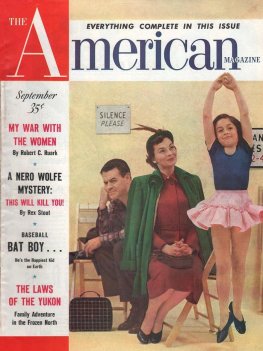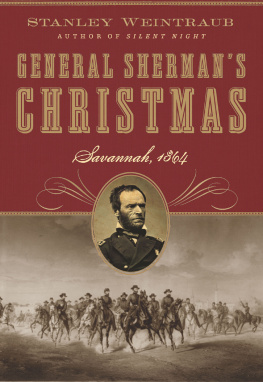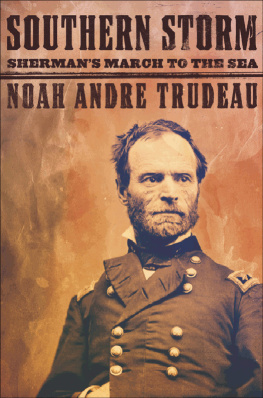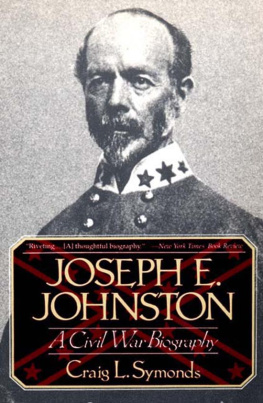This edition is published by Papamoa Press www.pp-publishing.com
To join our mailing list for new titles or for issues with our books papamoapress@gmail.com
Or on Facebook
Text originally published in 1959 under the same title.
Papamoa Press 2017, all rights reserved. No part of this publication may be reproduced, stored in a retrieval system or transmitted by any means, electrical, mechanical or otherwise without the written permission of the copyright holder.
Publishers Note
Although in most cases we have retained the Authors original spelling and grammar to authentically reproduce the work of the Author and the original intent of such material, some additional notes and clarifications have been added for the modern readers benefit.
We have also made every effort to include all maps and illustrations of the original edition the limitations of formatting do not allow of including larger maps, we will upload as many of these maps as possible.
GENERAL SHERMANS SON
BY
FATHER JOSEPH T. DURKIN, S.J.
TABLE OF CONTENTS
Contents
TABLE OF CONTENTS
PREFACE
by John LaFarge, S.J.
Father Durkins scholarly biography of Father Thomas Ewing Sherman came into being, like so many other books, as the result of a chance occurrence. In my autobiography, The Manner Is Ordinary, I quoted from a letter that my father wrote to me in the fall of 1905, shortly after I had entered the Jesuit novitiate at St. Andrew-on-Hudson, Poughkeepsie. In this letter Father referred to that wild raid of Fr. Sherman, I believe on horseback, passing through the country which his father ravaged and desolated. In his characteristic bantering fashion he expressed the hope that I, as a Jesuit, would not follow Father Shermans example.
My words of comment on Fathers letter drew the attention of one of the Sherman family relatives, who had read them, and was afraid my language might cause a false impression as to Father Shermans truly noble character. This led to discussions of the problem, and finally to asking Father Durkin to undertake the task of writing this biography.
For certain readers a question might quite naturally come to mind. Why relate the story of a Jesuit and a priest who had experienced such emotional and mental disturbance? What meaning could the average normal Christian draw from such a life? Why prolong a troubled tale by consigning it to print for future generations?
For many people no such explanation is needed. The story of Thomas Ewing Sherman is part of our countrys history, part ofor a sequel toa crucial phase of that history, to which today we pay an ever increasing attention. Whatever be our judgment as to the great figures of the tragic conflict of 1861-1865 and the subsequent decades, whether we esteem these personages or detest them, the contemporary mind wishes the entire story to appear. The life of Thomas Sherman, covering so many years and so many scenes and places, is an integral, even if a minor part, of that story.
However, quite apart from these strictly historical considerations, I believe, and many others of his own Jesuit brethren whom I have consulted believe, that the life-history of Father Sherman stands upon its own merits: both as to the personal caliber of the man himself, and as to the religious community through which he dedicated his life to Gods service.
Father Shermans life suffered, his biographer says, from a tragic flaw. Unfortunately this trait was not foreseen at a sufficiently early period, and may have been helped by a certain confusion that seems to have stayed with him as to the difference between religious (or Ignatian) obedience, and the military model that appealed so vividly to his soldierly imagination. But tragic flaw is but a relative term. His life was emphatically not a tragedy. On the contrary, it was a striking example of how a great soul could seek and find God and devote himself to the good of his fellowman despite such an obstacle. It is a testimony to the clarity of the spiritual ideal that he never for a moment lost from sight, even though his conduct at times seemed to militate directly against it; to the intensity and depth of that total dedication to the service of the Divine Master which he renewed with the very last breath of his truly apostolic life.
It seems to me only fair to point out that Father Shermans career also testified to the cordial charity of his fellow-priests and the prevailing patience and kindness of his Jesuit Superiors. The Superiors refusal to dismiss him, in fact their inability to dismiss him for acts, however vehement, for which he was not fully responsible, was itself a witness to the Societys total commitmentfor better or for worse, in sickness and in healthto its own members.
I do not remember having met Father Sherman personally, but do recall the esteem and affection in which he universally was held. That the South, the Deep South, offered the final hospitality to the son of William Tecumseh Sherman is a symbol of the peace and reconciliation that we pray may come to all regions and all peoples of our country.
Campion House
New York City
CHAPTER 1Beginnings Are Endings
MAY 24, 1865, was a mild Spring day in Washington. The trees along the Avenue, the tender green of the banks of the Potomac, the early buds in the gardens of Georgetownall provided a gentle and peaceful setting. But the city itself was buzzing with activity. The Willard, the National, and the numerous boarding-houses were crowded with visitors, and the sidewalks and streets were thronged with men and women in gay dress. The National Intelligencer was struggling to press with one of the most gaudy holiday editions in the history of American journalism. It was the second day of the review of the Grand Army of the Republic.
To young Thomas Ewing Sherman, a slim, grey-eyed, dark-haired, intense boy of nine, this was the greatest day in his life. His father, the hero of the day, would soon come riding down the Avenue. Tommy stood with his mother on the reviewing stand before the White House, next to the President, the members of the Cabinet, and other distinguished guests. Andrew Johnson, a nervous, gaunt man in black, looked very serious. Secretary of War Stanton was fussily giving orders to the police controlling the crowds. Mrs. Grant had her arm linked tightly to that of her husband. Grant, impassive, stood staring straight ahead. Yesterday his Army of the Potomac had had its hour of glory; today the divisions of the West were parading. The triumphant forces of the Union were showing themselves for the last time in a blaze of splendor.
Theyre coming! The word raced along the lines of waiting spectators. Soldiers swung down Pennsylvania Avenue to the roar of the crowds along the curbs. Down the broad street marched the regiments and divisions of the tatterdemalion Army of the West. They looked ragged and shabby, the tough, grim, fighting men of the Fifteenth Corps, the Nineteenth Illinois, and the Twelfth Wisconsinheroes of Donelson, Shiloh, Vicksburg, Savannah, Atlanta, and Chattanooga. With bands blasting, flags flying, with the proud prancing of officers mounts and the flash of the sun off bayonets, the victorious army of William Tecumseh Sherman swept on grandly.
There were broken soles on the marching shoes of some, and holes in their faded uniforms, but to the shouting watchers they were the unforgettable reminders of a thin line of infantry that irresistibly took the summits at Lookout Mountain; of Prentiss holding off a force three times his size at Shiloh; of Mower making his lightning move at Memphis, and of Corses handful who plugged the gap at Altoona. On they came with measured, disciplined swagger, the rough, hard-bitten battalions of the Army of Tennessee. Howard rode at the head of the Fifteenth and Seventeenth Corps. Slocum led the Fourteenth and Twentieth. Hazen, waving gaily to the ladies on the sidewalks, was in his place with the Fifty-third Ohio.









